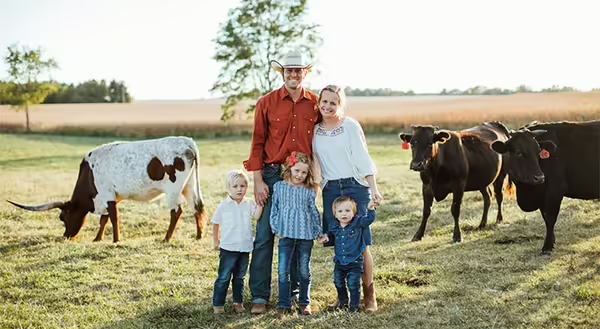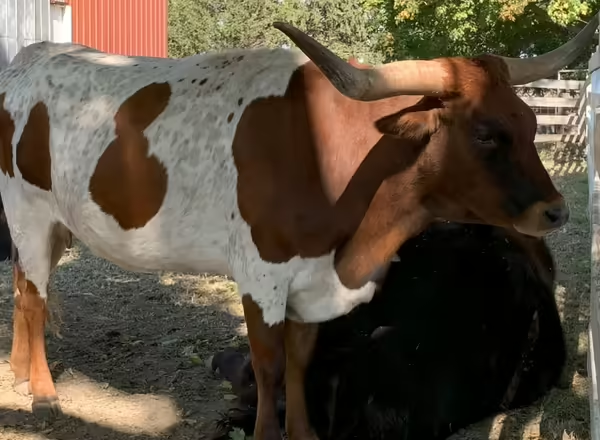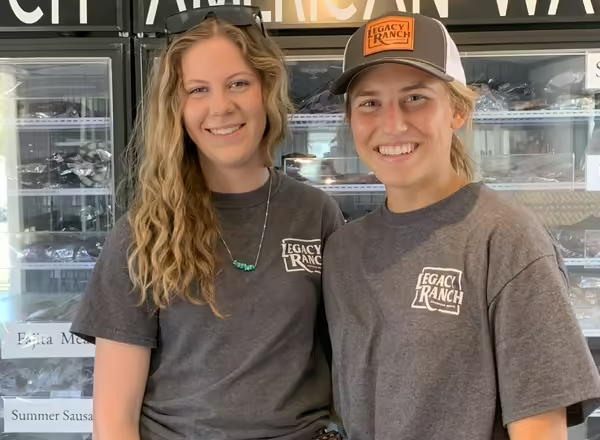
Sawyer and Abbie Cottrell are like many young ranchers. They want to give their sons and daughter a childhood that’s meaningful and that will live beyond themselves.
The Cottrell homestead sits at the end of a long gravel driveway just miles down the road from Eureka High School where Sawyer teaches agriculture classes. Cows and their calves graze on a grass lot on the left. Two pens of cattle are being fed and grown for meat production in the back lots.
First-Generation Rancher
Sawyer wasn’t raised on a farm.
“It’s one of those things I always wanted to do, but felt I was on the outside looking in,” Sawyer says. “I never thought I had a chance. The ranch is a dream come true.”
The couple rented the homestead and pasture acreage to start raising Angus cattle.
“I don’t own an acre of land, and we ask ourselves if it will all go away one day,” Sawyer says. Financially, they, like many first-generation farmers, simply can’t afford or find available land to buy. “We were renting 10 acres of pasture and not making any money. It was just an expensive hobby.”

Sawyer earned a degree in agricultural education, then began teaching ag classes at Eureka. In addition, he shifted his cattle production from Angus to Wagyu cattle, a high-quality, high-marbling cattle breed, and created Legacy Ranch American Wagyu in 2021. The Cottrells are classified by the United States Department of Agriculture as beginning ranchers.
They took on large debt to rent pastureland, invested in quality beef cattle genetics, and built their marketing program. This year, as their June 1 loan deadline drew near, the couple knew they were not on track to make that payment. They considered selling their equipment and letting their employees go.
IL-EATS Finds Legacy Ranch
Despite their financial challenges, their focus was not on themselves; it was on the needs of others. The couple serves as role models to youth in their community. “God’s given us gifts to invest in people’s lives; we’ve just never had a lot of money to give,” Sawyer says. “Still, we wanted to give the ranch a mission.”
One evening, their family devotions focused on giving “until it hurts,” Sawyer says. They decided they needed to do more, so, even though their own financial situation was bleak, they approached the Midwest Food Bank in Morton with an opportunity. For every box of snack sticks the ranch sold privately, it would donate a box to the food bank’s disaster relief program.
The food bank presented Sawyer an unexpected twist, the new Illinois Equitable Access Towards Sustainable Systems program that provides funds to buy locally produced food. IL-EATS builds collaborations between farmers and food system organizations to provide locally grown fresh foods to underserved communities.
Jeni Hanson, the food bank’s procurement manager, offered to pay retail price for the ranch’s beef using IL-EATS funding. Suddenly, a new market opened up for the ranch. In its first delivery, Legacy Ranch sold 4,600 pounds of beef and fully met its loan obligation.
“This program has changed our lives,” Sawyer says. “We’re on a totally different trajectory now. We haven’t fully processed what IL-EATS is doing for our family.”
The couple has hopes of being able to afford their own land one day. “It’s a God story,” Sawyer says. “He knew what we needed when we needed it.”
Building the Wagyu Ranch
A friend introduced Sawyer to Wagyu [pronounced waa·gyoo] cattle, originating from Japan, with increased marbling that results in high-end, tasty steaks. He used artificial insemination to breed his first five Angus cows to a Wagyu bull. While those calves matured, Sawyer bought several market-ready cattle that allowed him to harvest and market meat for immediate income.
He expanded the herd and bought half-Wagyu cows and a full-blooded red Akaushi Wagyu bull named Tex from Texas, as well as a black Wagyu bull. Red Wagyu are known for their high growth potential; black Wagyu are known for their high marbling characteristics.

Another ranch favorite is Maggie, a Texas Longhorn, that produced a heifer calf sired by Tex. Sawyer will evaluate the resulting half-Longhorn, half-Wagyu calf for breeding and marbling potential.
Today, Legacy Ranch American Wagyu raises about 25 cows for breeding and feeds about 30 steers and heifers for beef production and harvest. They calve in both spring and fall to have meat available throughout the year.
The ranch doesn’t have the pastureland they need to expand their cow herd, so they’ve developed a bull-leasing program. They lease bulls to area farmers who breed them to their cows, then Sawyer buys back the half-Wagyu calves at a premium price.
Products and Marketing
Sawyer markets to a specific client, backyard grillers who want high-quality prime beef cuts. Legacy Ranch provides nationwide two-day shipping. They’ve built an impressive contact list for their top cuts, including ribeye, New York strip, filet mignon, Denver steak, flank steak, and center-cut sirloin.
In addition to prime cuts, a beef carcass yields cuts that are not as aggressively purchased, including ground beef. To use the excess ground beef, Sawyer, worked with Springfield meat processor Turasky Meats, to successfully create a Wagyu beef snack stick that is shelf-stable and requires no refrigeration. The snack sticks are sold in local businesses in addition to the Midwest Food Bank.
The ranch operates The Farm Store, a small retail storefront in Eureka. On Fridays, the team grills Wagyu burgers for customers. “That’s about as good as you can get with vertical integration,” Sawyer says. “We want to take down every entry barrier to try our product. It’s as farm-to-table as you could possibly get.”
Expanding Opportunities for New-to-Farming Youth
Sawyer tells his students that it comes down to hard work and building relationships.
“Being a first-generation rancher, I feel there is a negative stigma to getting into farming,” Sawyer says. “It’s a huge undertaking, and it’s difficult to do, but it is not impossible.”
“You have to put yourself out there and be willing to work your tail off,” Sawyer says. “I’ve had to learn it from the ground up. I will never be done learning.”

The ranch employs two former FFA students, Naomi Wegner and Kylie Balducci. Naomi had no farming experience when she started and has learned to work with cows and rake hay.
Kylie excels in marketing and has refined her career goals because of her work at Legacy Ranch. “I want to build my own small western brand,” she says. “Sawyer allows us to chase our own goals.”
Kylie and Naomi handle the shipping of products, the Farm Store sales, and the weekly grilling. “Grilling hamburgers on Fridays is a good way to talk to people and build relationships,” Kylie says. “The beef is amazing, but that’s not the point, really.”
Sawyer would agree. “We don’t farm grass; we are farming relationships,” he says. “If we don’t have relationships, we don’t have a business.”
Right Place, Right Time
“Without IL-EATS, we would have been starting to sell the equipment and let our employees go,” Sawyer admits. “We’ve all been called to steward what we’ve been given. We have a shot now of making this happen long term.”
Sawyer hesitated entering the IL-EATS program, saying it felt like an “easy button.” Now he understands how many people benefit from the increase in meat products he’s able to provide the food bank.
“We’re using it [IL-EATS funding] exactly how it’s intended — to help small farmers get their feet under them and establish a foundation to build their business on,” Sawyer says. The expanded market allowed the ranch to pay down some debt while it reimagines its new future.
What Comes Next?
Sawyer plans to join the American Wagyu Association and work with USDA to verify their Wagyu label authenticity to expand their snack sticks to larger markets. The income from their increased IL-EATS sales will provide the cashflow they need to invest in products and marketing.
“We want to create a small farm boutique platform that sells other farms’ products to tell their stories with ours,” Sawyer says. They hope to expand the Eureka storefront. That opportunity would have been unachievable without the IL-EATS program.
To find Legacy Ranch beef products and learn more about their story, visit the Legacy Ranch American Wagyu website. Sawyer credits his branding success to Farm Rebel. Learn more about Illinois-EATS.